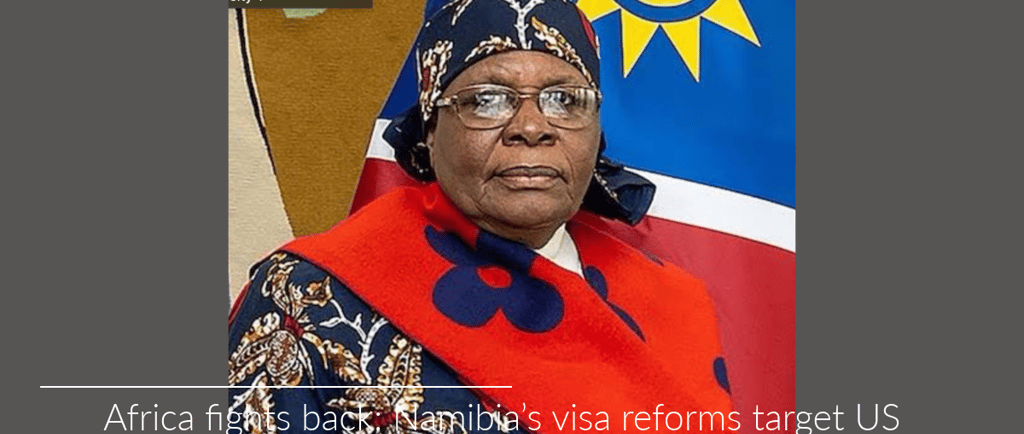Namibia’s Visa Policy Shift and Deportation of Americans
4/16/2025


Namibia’s Visa Policy Shift and Deportation of Americans
On April 15, 2025, Namibia’s first female president, Netumbo Nandi-Ndaitwah, reportedly ordered the deportation of over 500 American nationals residing in the country without valid visas, marking a significant shift in its immigration policy. This action, effective from April 1, 2025, requires U.S. citizens to obtain visas before entering Namibia, a move framed as a response to the visa requirements imposed on Namibian citizens by the United States and other nations. The policy has sparked global debate on visa reciprocity, fairness in international travel, and diplomatic relations, reflecting broader tensions in global immigration policies.
Context and Timing
Given the current date, April 15, 2025, this policy is already in effect, with deportation notices being served to affected Americans. The decision aligns with Namibia’s broader initiative to ensure parity in diplomatic interactions, as outlined in recent announcements from the Namibian government. This timing coincides with increased scrutiny of visa policies globally, particularly in the context of African nations seeking reciprocal treatment from Western countries.
Policy Details and Rationale
Namibia’s new visa requirements target citizens of 33 countries, including the United States, Germany, the United Kingdom, and Canada, effective from April 1, 2025. Previously, these nationals enjoyed visa-free access, but the policy shift mandates visa applications in advance through Namibia’s online visa portal or upon arrival at major entry points like Windhoek International Airport and Walvis Bay. However, the visa-on-arrival system is new and subject to change, as noted by the U.S. Embassy in Namibia ([U.S. Embassy in Namibia]
President Nandi-Ndaitwah emphasized the need for reciprocity, stating, “If Africans need visas to enter the USA, then Americans must also need visas to enter Namibia,”. This stance is part of a broader effort to address imbalances where Namibian citizens face stringent visa requirements to enter Western nations. In contrast, their citizens have enjoyed easier access to Namibia. Government sources confirm that the deportation order targets over 500 Americans who have either overstayed their permitted time or entered without adhering to immigration procedures, with officials commencing serving notices.
Impact on Americans in Namibia
The immediate impact is the deportation of over 500 American nationals, affecting those found in violation of the new visa regulations. The U.S. Embassy has advised travelers to carry a hard copy of their visa approval notice and to prepare for potential changes in the visa-on-arrival system ([U.S. Embassy in Namibia]
This policy could disrupt existing travel plans and strain diplomatic relations, with the U.S. State Department yet to issue an official response as of April 15, 2025, according to
Broader Implications and Global Reactions
Namibia’s policy shift is seen as a bold assertion of sovereignty and a call for equity in international travel. It challenges the long-standing practice where citizens of powerful nations enjoy visa-free access to many countries, while citizens of less influential nations face stricter requirements. This move could inspire other African nations to adopt similar measures, potentially reshaping global travel dynamics, as suggested by [USAfrica Online]
Reactions have been mixed, with some viewing it as a necessary step towards fairness, while others worry about potential diplomatic tensions. The policy has sparked intense global debate, drawing attention to long-standing imbalances in visa policies, as noted by [Diaspora Digital Media DDM] . It remains to be seen how this development will affect tourism, business, and bilateral relations between Namibia and the United States, with potential for negotiations or adjustments in visa agreements.
Cultural and Economic Considerations
Namibia’s decision could impact American tourism, a significant sector given Namibia’s appeal for its landscapes and wildlife. The policy may deter some travelers due to additional visa costs and procedures, potentially affecting local economies reliant on tourism revenue. Conversely, it reinforces Namibia’s stance on national dignity and could strengthen domestic support for the government’s assertive foreign policy.
For Americans, the policy underscores the importance of understanding visa requirements before travel, especially in regions where reciprocity is increasingly demanded. It also highlights the need for cultural sensitivity and awareness of local immigration laws, as advised by travel resources like [Japan Guide]([invalid URL, do not cite]) for similar contexts.
Detailed Itinerary and Practical Advice
While the user’s original query was about a Japan itinerary, the context here shifts to Namibia’s policy. For Americans planning to visit Namibia, the following table outlines key steps based on current information:
Additional Considerations
The policy’s long-term effects could include increased diplomatic negotiations, potential economic impacts on tourism, and a precedent for other nations seeking reciprocal visa arrangements. It also raises questions about the fairness of current international travel norms and whether they reflect historical power imbalances, as discussed in [BBC News]
For first-time visitors to Namibia, this policy underscores the importance of planning and understanding local regulations, similar to the travel tips provided for Japan in the user’s original query. However, the focus here is on the diplomatic and travel implications of Namibia’s bold move.
hello@boncopia.com
+13286036419
© 2025. All rights reserved.